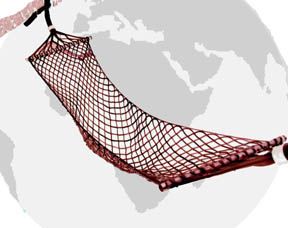Plastic shopping bags
When we go shopping we can carry our own shopping bags made of long lasting environment friendly material instead of using the single use plastic bags that are usually available in the shops. Secondly, if we have to shop for our requirements in more than one shop, we can refuse the bags offered by every shop and instead carry all our purchases in one bag. The results of such a practice can be many. If we use less bags, we will manufacture less bags and throw away less bags. One might argue that when we dispose used shopping bags, they are sent for recycling through the garbage handling process. But not all countries have efficient garbage handling processes, and even in those countries that do, the recycling process also consumes energy. So less recycling means consuming less energy.
According to the Worldwatch Institute, factories around the world churned out a whopping 4 - 5 trillion plastic bags in 2002. (For more information you may visit their website through this link: http://www.worldwatch.org/node/1499) And we can bet that unless we do something about it ourselves, this number is going to go up.
Using less plastic bags will naturally lead to use of less plastic which is a material obtained by processing scarce petroleum in one form or the other. To do a very rough calculation, assuming that we still use only 5 trillion plastic bags a year and each weighs 5 grams (average), if we are able to reduce the number of bags used by half, we would be producing and either dumping or recycling 12.5 million tonnes less plastic each year. Surely one preventive action is more powerful than many corrective actions.
Tuesday, October 17, 2006
Environment friendly practices
This is a space where we can share our ideas about practices that can have a positive impact on our environment.
Saturday, October 14, 2006
Reverse colonialism
Reverse Colonialism
In the colonial era it was possible for the colonizers to rob the colonies of their natural wealth in the name of king, queen, god or nation. This is how these nations accumulated most of their national wealth, which is something they enjoy even today. As these colonies regained their independence , it was not possible to get these natural resources for free anymore. The erstwhile colonizers could however still get access to these resouces for almost next to nothing. The low standard of living in these impoverished nations compelled them to sell their resources cheaply. And as the 'developed' countries sold back the finished products to the 'developing' world for higher prices, they got even richer.
The low standard of living was mostly was a curse to these poor nations but was also a blessing in some ways. With rising literacy they could provide a source of cheap skilled labour. Globalization and information technology meant that these reservoirs of cheap labour could be tapped by the developed nations, resulting in the migration of labour and capital in opposite directions.
The migration of capital from the richer to the poorer nations had mostly positive implications. While the rich nations could tap into the cheap labour resources, the poorer nations also benefited because millions of jobs were created. As standards of living rose, consumption also increased and resulted in the creation of 'emerging markets'.
While movement of labour however had positive as well as negative outcomes, on balance, at least looking at the world as it is today, one might say that the negatives outweigh the positives. While the source nations suffered from brain drain as the best minds left for greener pastures abroad, the receiving nations suffered from problems related to the integration of these aliens into their society. Naturally the developed nations wanted to make more money out of the flow of capital and labour. They preferred to let the labour stay outside, did not mind if the capital had to go out so long as it was protected as long as the money was coming in.
Capital and labour are the two fundamental building blocks of all economic activity and what makes them work together to create any measurable outcome is leverage. If they work together they creative positive leverage and if they work against each other you have chaos.The direction in which they work relative to each other is determined by self interest. Most of the troubles of the present day originate from the fact that we prefer to see only one side of the story and not the other.
Looking at things as they are today, it would be an interesting exercise to extrapolate current trends to see what the world might look like 20 years from now. Are we going to see more chaos as the negative effects of migration overwhelm the positive effects of globalization? Will the rich nations raise more barriers to protect their wealth as they have successfully done in the past? Will the emerging economies succeed in bridging the gap from the haves to the have-nots? Are we going to see greater disparity or will globalization create a win-win scenario and result in creation of new wealth? What happens if some of the most populous countries in the world join the club of rich nations? Will they change the direction of economic power and leverage? What will fuel the next step of progress for the developed world?
The answers to these questions will determine the state of our world in the days to come. When we go out in search of truth, sometimes the journey itself is the destination.
In the colonial era it was possible for the colonizers to rob the colonies of their natural wealth in the name of king, queen, god or nation. This is how these nations accumulated most of their national wealth, which is something they enjoy even today. As these colonies regained their independence , it was not possible to get these natural resources for free anymore. The erstwhile colonizers could however still get access to these resouces for almost next to nothing. The low standard of living in these impoverished nations compelled them to sell their resources cheaply. And as the 'developed' countries sold back the finished products to the 'developing' world for higher prices, they got even richer.
The low standard of living was mostly was a curse to these poor nations but was also a blessing in some ways. With rising literacy they could provide a source of cheap skilled labour. Globalization and information technology meant that these reservoirs of cheap labour could be tapped by the developed nations, resulting in the migration of labour and capital in opposite directions.
The migration of capital from the richer to the poorer nations had mostly positive implications. While the rich nations could tap into the cheap labour resources, the poorer nations also benefited because millions of jobs were created. As standards of living rose, consumption also increased and resulted in the creation of 'emerging markets'.
While movement of labour however had positive as well as negative outcomes, on balance, at least looking at the world as it is today, one might say that the negatives outweigh the positives. While the source nations suffered from brain drain as the best minds left for greener pastures abroad, the receiving nations suffered from problems related to the integration of these aliens into their society. Naturally the developed nations wanted to make more money out of the flow of capital and labour. They preferred to let the labour stay outside, did not mind if the capital had to go out so long as it was protected as long as the money was coming in.
Capital and labour are the two fundamental building blocks of all economic activity and what makes them work together to create any measurable outcome is leverage. If they work together they creative positive leverage and if they work against each other you have chaos.The direction in which they work relative to each other is determined by self interest. Most of the troubles of the present day originate from the fact that we prefer to see only one side of the story and not the other.
Looking at things as they are today, it would be an interesting exercise to extrapolate current trends to see what the world might look like 20 years from now. Are we going to see more chaos as the negative effects of migration overwhelm the positive effects of globalization? Will the rich nations raise more barriers to protect their wealth as they have successfully done in the past? Will the emerging economies succeed in bridging the gap from the haves to the have-nots? Are we going to see greater disparity or will globalization create a win-win scenario and result in creation of new wealth? What happens if some of the most populous countries in the world join the club of rich nations? Will they change the direction of economic power and leverage? What will fuel the next step of progress for the developed world?
The answers to these questions will determine the state of our world in the days to come. When we go out in search of truth, sometimes the journey itself is the destination.
Subscribe to:
Posts (Atom)

